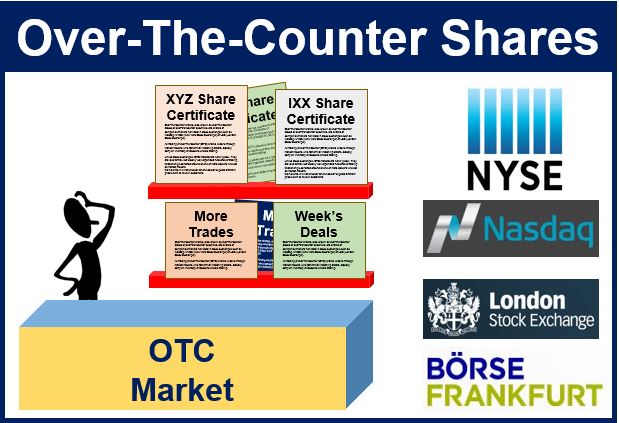What are over-the-counter shares? Definition and meaning
Over-the-counter shares, also known as over-the-counter stocks or over-the-counter securities, are shares of companies that are not listed in stock exchanges such as Nasdaq, NYSE (New York Stock Exchange) or LSE (London Stock Exchange).
All trading of over-the-counter (OTC) shares is done through market makers, who rather than matching orders, actually carry an inventory of stocks to enable trading.
Unlike stock exchanges, OTC markets are not a ‘place’. They are less formal, but usually well organized networks of trading relationships centered around one or more dealers who act as market makers.
Dealers in the OTC markets quote prices at which they ask (sell) or bid (buy) to other dealers and their customers.
They might not quote the same price to other dealers as they do to their clients and it is not unusual for one dealer to quote different prices even to its own customers.

Many companies either do not meet the listing requirements for an exchange or are unwilling to pay the cost.
Over-the-counter shares traded less openly
Dealers of OTC shares may withdraw from market making at any time, a move that can result in liquidity evaporating and the disruption of market participants’ ability to trade.
Stock exchanges are much more liquid than OTC markets because all trading as well as execution prices are done in the open – everybody can see what is going on.
In some stock markets, certain participants are designated as dedicated markets makers who have to maintain bid and ask quotes throughout the trading day.
Put simply, OTC markets are much less transparent and operate with fewer regulations than exchanges do.
According to the IMF (International Monetary Fund):
“All of the securities and derivatives involved in the financial turmoil that began with a 2007 breakdown in the U.S. mortgage market were traded in OTC markets.”
OTC markets – bilateral trading
OTC dealers quote their bid and ask prices through the telephone, mass emailing, and increasingly, instant messaging. Many post their quotes on electronic bulletin boards.
The process of negotiating by phone or email, whether dealer-to-dealer or customer-to-dealer is known as bilateral trading, because only two participants in the market directly observe the quotes or execution.
In most OTC trading, others in the market know nothing about the trade. Some brokered markets, however, do post execution prices and the size of the transaction after it is done.
The IMF writes “Although the bilateral negotiation process is sometimes automated, the trading arrangement is not considered an exchange because it is not open to all participants equally.”
OTC Bulletin Boards
Regarding OTC Bulletin Boards, William Baldwin, a writer in Forbes, warns investors to do their homework before deciding whether to buy shares.
“Buy a stock randomly plucked from the OTC Bulletin Board and there’s a significant risk of overpaying. The market has a lot of good companies but is also a playpen for pump-and-dump scammers.”
He also advises investors to place only ‘limit orders’ – trades which specify the most you are willing to pay for a share, or the least you will sell it for.
Unlisted stocks tend to be small in capitalization. However, there are some exceptions. Depositary receipts of pharmaceutical giant Roche are unlisted – but the company has a market cap of $138 billion.
Approximately 16% of all stock trades in the United States in 2008 were ‘off-exchange trading’, i.e. done in the OTC market. In April 2014, the percentage increased to about 40%.

